What’s happening with the pro-Palestinian protests at the University of Washington
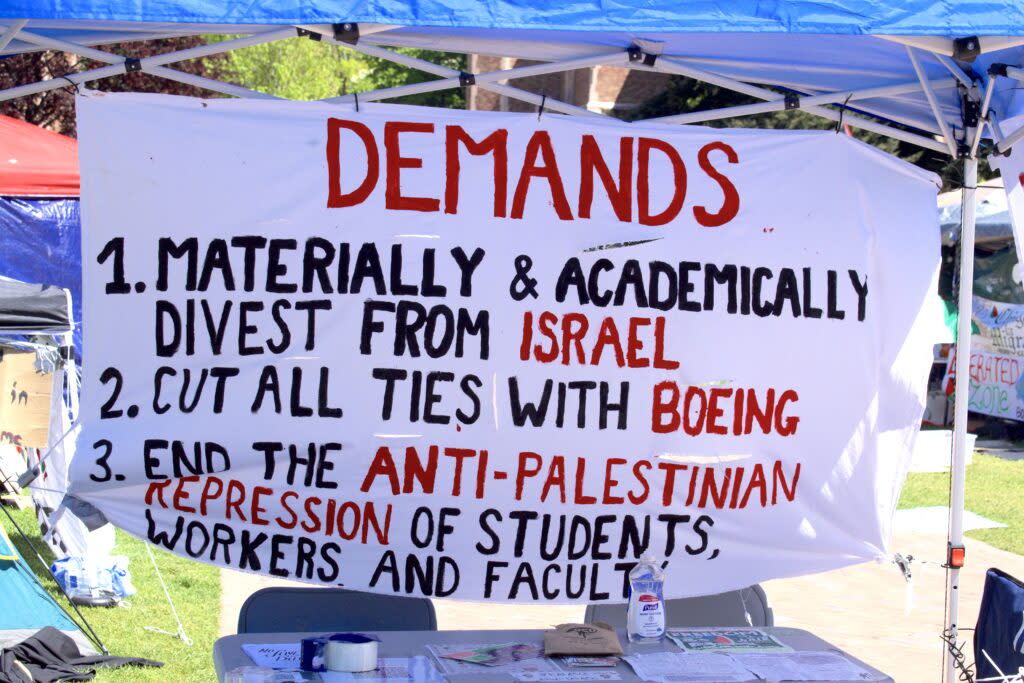
A list of demands at UW's Popular University for Gaza Liberated Zone, an encampment at the UW Quad. Thursday, May 9, 2024. (Grace Deng/Washington State Standard)
Update: On Friday night, the University of Washington issued a statement calling for the campus protesters to dismantle their encampment voluntarily, citing security concerns ahead of a pro-Israel counter-protest being organized on Sunday. The university said the counter-protest “gives us significant concern because of the likelihood for confrontations” and that “every day the encampment remains, the security concerns escalate and become more serious – for our UW community and for the people in the encampment itself.”
“We have repeatedly conveyed our concerns about these risks to encampment organizers and to those who organize counter-protests. We are grateful to all, including leadership in the Jewish community, who are working to deescalate the situation. We also welcome the efforts of Muslim and Palestinian leaders who are working to deescalate,” the statement said. The university also said that its “response to students’ call for change will not be based on an encampment. It will be through constructive engagement on issues that are important or meaningful to our students and broader campus community.”
The full statement from UW can be found here. The original article continues below.
It’s been 11 days since students began an encampment at the University of Washington that they’re calling the “Popular University for Gaza Liberated Zone.”
They’re not the only pro-Palestinian encampment that’s appeared in Washington to protest Israel’s actions in its war against Hamas in Gaza and the treatment of Palestinians over the past 75 years: Evergreen State College in Olympia and Puget Sound University in Tacoma have also seen encampments.
Israel’s assault on Gaza has killed more than 34,500 Palestinians, most of them women and children, the Associated Press reported on Friday, citing local health officials in Gaza. Israel’s assault followed the militant group Hamas’ Oct. 7 attack on the country, which killed about 1,200 Israelis. Hamas also took around 250 hostages.
The encampments in Washington are part of a student movement against Israel’s offensive in Gaza that began with Columbia University and has reached over 100 colleges and universities in the United States. The movement has recently gone international, spreading to the United Kingdom, parts of Europe, Lebanon and India.
Here’s what you need to know about the encampments.
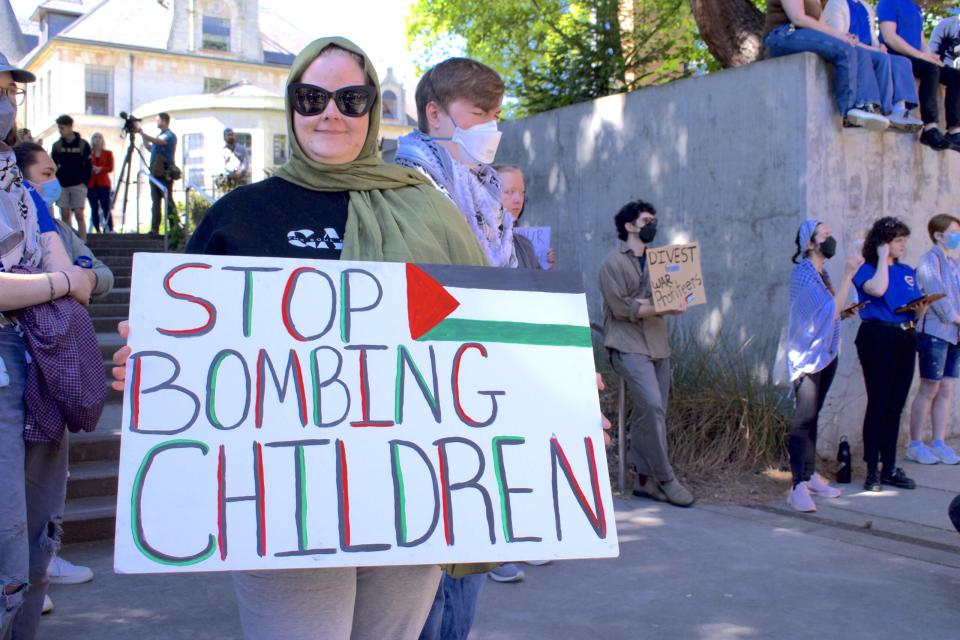
A protester holds a sign that says “stop bombing children.” May 9, 2024. (Grace Deng/Washington State Standard)
What are students protesting?
Simply put, they’re protesting their universities’ ties to companies that supply arms to Israel and what they say is their universities’ complicity in the deaths of Gazan civilians. Students are demanding universities call for a ceasefire and divest from Israel — in other words, withdraw any investments made in companies linked to Israel.
“Is it fair that I have to stand here begging my university to cut ties with those who have actively profited off of the murder of my family?” asked Hanady Shaqur, a 21-year-old Palestinian student, at a Thursday meeting in front of the UW Board of Regents. Shaqur said she’s lost 159 family members in Gaza.
The students in Washington want their administrators to cut all ties with Boeing, a major arms supplier to the Israel Defense Forces. In 2020, Boeing estimated that Israel will buy $10 billion worth of military products from the company in the next decade. Boeing is close to an $18 billion deal with Israel, CNN reported in April, and was awarded a $927 million contract with Israel in 2022. These deals are often facilitated by the United States government, which is by far Israel’s largest arms supplier.
According to Amnesty International, there’s evidence Israel has used Boeing’s weapons in attacks that have killed civilians. Boeing has donated more than $100 million to the University of Washington since 1917.
“It breaks my heart to know that my university is so closely tied with Boeing,” said Anaëlle Enders, an undergraduate student studying Middle Eastern Languages and Cultures. “That we are, by association, fueling and funding the genocide, not only in Palestine, but in destruction around the world.”
A United Nations expert said in March that there’s “reasonable grounds” to believe Israel is committing genocide, but it’s still being debated among genocide scholars and under international law.
Is this only about the Israel-Hamas War?
University of Washington students say Israel’s assault on Gaza did not begin with Oct. 7, and they’re also protesting the “75 years of oppression, of ethnic cleansing, of ongoing occupation, and a legal system now recognized by Amnesty International and Human Rights Watch as a system of apartheid.”
“Look up Nakba,” said one sign at a Thursday protest ahead of the UW Board of Regents meeting. The sign refers to the 1948 war surrounding Israel’s creation. Palestinians call it “Al-Nakba,” which translates to “The Catastrophe.”
During the Nakba, an estimated 700,000 Palestinians were violently displaced from what is now Israel, expecting to return after the war. At least 15,000 were killed. 75 years later, those who survived still haven’t been allowed back.
University of Washington students also want administrators to end study abroad programs with Israel and “the anti-Palestinian oppression of students, workers and faculty.” That last demand includes amnesty for students participating in pro-Palestinian protests.
What has UW’s response been?
University of Washington administrators have not called police on the encampment, unlike at some encampments across the country.
However, that doesn’t mean university administrators are conceding to the students’ demands. There may be no other school in the country that has as much to lose from corporate divestment, writes Seattle Times investigative reporter Mike Reicher. In February, UW’s president said the university will not divest from Boeing.
A media liaison for the UW United Front for Palestinian Liberation, Oviya — who identified themselves only by their first name — said the protesters will not move until their demands are met, and that they still have hope the university will concede.
“I believe that the increase in student support and community support for the divestment from Boeing will motivate [UW president] Ana Mari Cauce to change her stance and not to stand with morally reprehensible companies such as Boeing,” said Oviya, a UW senior.
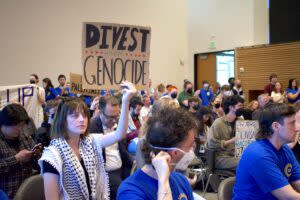
A protester at the UW Board of Regents meeting on Thursday holds a sign that says “divest from genocide.” May 9, 2024. (Grace Deng/Washington State Standard)
“I really want to emphasize that this is possible and it has been done before,” they added, pointing to the University of Washington’s divestment from South Africa in 1986 during apartheid.
The University of Washington has had at least four conversations with representatives of student organizers and is open to continuing those conversations, said spokesperson Victor Balta.
“Our goal in these conversations is to better understand the group’s concerns and our hope, of course, is to eventually reach a conclusion and an end to the encampment in order to maintain the safety of everyone involved,” Balta said in an emailed statement.
Meanwhile, the Associated Students of the University of Washington, elected by the student body, passed a divestment resolution 46-6 in support of the United Front’s demands.
“It’s time for us to take a stand against the atrocities committed against the Palestinian people,” said Yoseph Ghazal, a Palestinian law student, speaking on the resolution passed in front of the UW Board of Regents Thursday.
Why are students calling their encampment the “Popular University for Gaza Liberated Zone?” What happens at these encampments?
The “Popular University for Gaza” is what the National Students for Palestine movement is labeling the student movement. Students across the country say they’re claiming their universities in solidarity with Palestine because there aren’t any left in Gaza. Israel blew up Gaza’s last standing university in January.
“We will reclaim our education and decide what we learn and how we gather until our universities divest,” writes the UW United Front for Palestinian Liberation on Instagram.
Encampments across the country, including at the University of Washington, are holding daily events, teach-ins and workshops related to Palestine, safety while protesting and other political issues.
The University of Washington’s encampment, which has grown to around 150 tents, also has a mutual aid tent, where students share water, food and other resources, and a “disability justice” tent, which offers free masks, earplugs and other supplies meant to make protesting more accessible for students with disabilities.
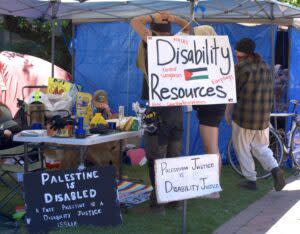
The disability justice tent at the UW Popular University for Gaza Liberated Zone. May 9, 2024. (Grace Deng/Washington State Standard)
Videos on social media have shown some confrontations between students and counterprotesters — most notably during a visit from conservative activist Charlie Kirk on Tuesday. The Standard has not independently verified any videos of confrontations.
The Standard did not see any counter-protesters during a peaceful Thursday visit.
The Pursuit NW, a non-denominational church with campuses in Seattle, Kirkland and Snohomish, is planning a “United for Israel” rally at the University of Washington on the afternoon of Sunday, May 12th.
What are Washington’s politicians saying?
Gov. Jay Inslee is getting regular updates on the situation at the University of Washington, according to spokesperson Jaime Smith.
“Given the volatile outcomes on other campuses nationally, the governor believes the safety of protesters, counter-protesters, observers, and the public at large is paramount,” Smith said.
“While free speech needs to be maintained, it is absolutely vital that the university’s basic functions are not disrupted for other students and the broader community,” she added.
Inslee’s office also told KUOW that the governor is hoping for a “durable” ceasefire. His office declined to comment on Washington’s close relationship with Boeing.
Several gubernatorial candidates, including Democrat Mark Mullet and Republican Dave Reichert, have said they’re concerned about the safety of Jewish students and anti-semitism on campus.
What about concerns of antisemitism?
Local Jewish organizations have reported a staggering rise in antisemitism since Oct. 7 and the Council on American Islamic Relations’ Washington chapter has reported skyrocketing Islamophobia.
At the University of Washington, Jewish students and parents have voiced worries about antisemitism and campus safety. Muslim students, too, have voiced concerns about their safety: One Black and Muslim student reported having a knife pulled on her while she was praying.
Some Jewish groups, including the international Jewish advocacy group the Anti-Defamation League, define anti-Zionism as anti-semitism, and thus see the student protests as anti-semitic. Zionism is the belief that Judaism should be a nationality, as well as a religion, and that Jews deserve a homeland in Israel.
The phrase “from the river to the sea, Palestine will be free,” which is often chanted by protesters, has also been deemed anti-semitic by some who interpret the phrase as a call to eradicate Israel. Others say the phrase historically gained traction to call for a “secular, Democratic and free Palestine.”
Students at the encampments reject a definition of anti-semitism that conflates it with anti-Zionism and point to support from Jewish students and Jewish anti-Zionist groups like Jewish Voice for Peace. University of Washington students, alongside encampments across the country, have held Shabbat led by Jewish Voice for Peace.
Signs across the University of Washington’s encampment declare things like “genocide is not a Jewish value,” “not in our name” with a Star of David and “never again means never again for anyone,” comparing the Holocaust to what’s happening in Palestine.
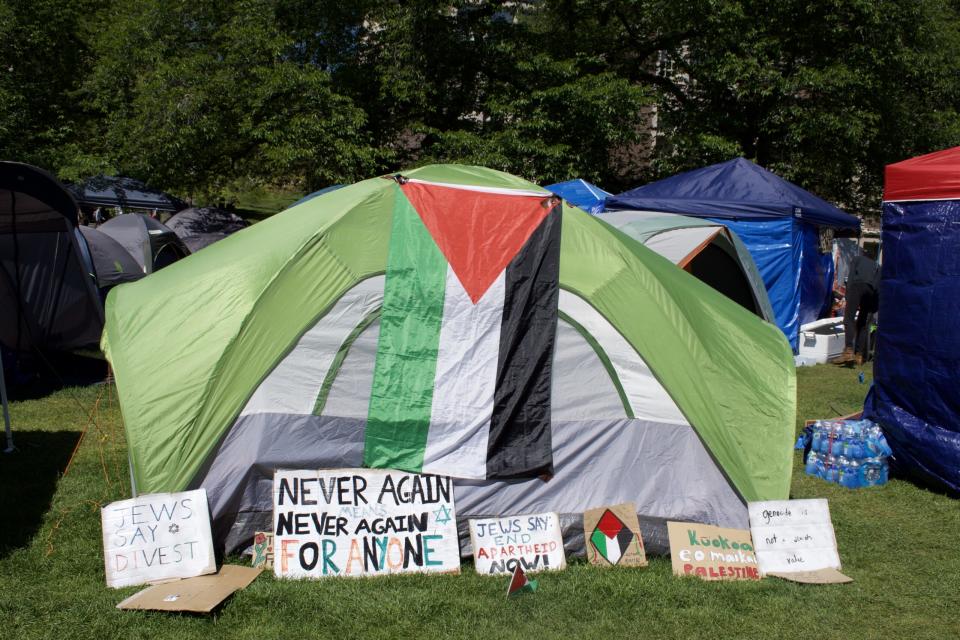
A tent at the UW encampment. May 9, 2024. (Grace Deng/Washington State Standard)
Who do I follow to learn more about what’s happening?
Student journalists across the country are providing some of the most up-to-date information on their respective campus encampments. That includes UW Daily, the University of Washington’s student paper.
The post What’s happening with the pro-Palestinian protests at the University of Washington appeared first on Washington State Standard.

